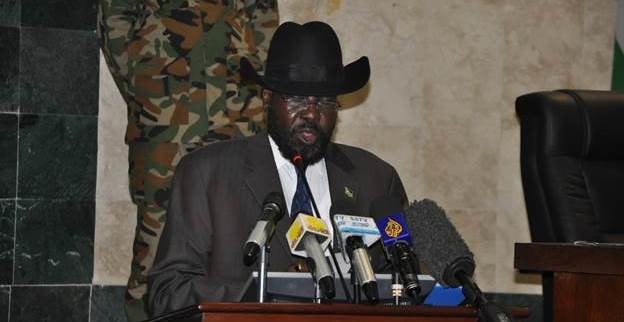Austerity will remain the guiding principle of South Sudan’s national budget in spite of renewed oil revenues, President Salva Kiir said during opening remarks to the national assembly on Tuesday. “We must keep our belts tight until the end of the year,” he urged lawmakers.
The suspension of oil production in January 2012 caused South Sudan to lose 98% of its revenues, forcing difficult and swift spending cuts. An era of austerity that did not come without a price, the president said: “It is not possible to leave austerity behind straight away. We must pay our dues.”
As the wells are slowly resuming their pumping operations, oil revenues are to be used to service the new country’s foreign debt. The state’s spending capabilities are expected to gradually return to their pre-shutdown levels, with particular focus on infrastructure development, health and education.
Kiir disclosed that as the country prioritizes debt service, it will also take on major new loans from the People’s Republic of China. He explained that these would help complete the new $150 million Juba International Airport terminal and the construction of key road and electric infrastructure.
An official at the Chinese Embassy in Juba, however, told Radio Tamazuj that the loans for the road and power networks had yet to be approved by Chinese state banks. He revealed that they would be lent at a 2% interest rate.
Acknowledging South Sudan’s current economic reliance on the international community, Salva Kiir also expressed gratitude to the foreign donors who “kept the country afloat,” but stressed that the nation would always retain its full political and economic sovereignty. He was referring to earlier criticisms of the 2012 oil shutdown, a move he defended yet again Tuesday saying, “Our resources are ours to exploit, or leave in the ground as we see fit.”
Unity and peace
Expressing his responsibility towards the “teachers and nurses, the messengers and the tea-ladies, the cattle-herder, fishermen and farmers,” the president called for national unity and reconciliation for the sake of economic development. Recalling an old African proverb, he emphasized that “a boat doesn’t move forward if everybody paddles their own way.” ‘True reconciliation’ through an inclusive and people-driven process, he said, is one of his top priorities for South Sudan.
Referring to the 8 March ‘matrix’ agreement and the earlier Addis Ababa accord, the president took the opportunity to reaffirm the country’s commitment to peace with the Republic of Sudan and his perseverance in implementing the 68-points matrix. “As a career soldier, I truly know the devastation of war and understand the terrible price which it could exact upon our people,” he said.
These remarks come a week after Salva Kiir withdrew by decree the executive powers delegated to Vice President Riek Machar to chair the National Reconciliation Committee. A new committee was appointed this Monday, chaired by the Archbishop of Episcopal Church, Daniel Deng Bul.
Opposition: ‘Everyone paddling their own way’
House Minority Leader Onyoti Adigo (SPLM-DC) expressed doubts about the president’s speech and the government’s ability to lead the nation. The South Sudanese boat may not “move forward if everyone paddles in their own way,” he said.
“If Salva Kiir is the pilot and there are other pilots in his government, then the boat cannot move well because everybody is paddling towards another direction,” Onyoti said in an interview with Radio Tamazuj. Nonetheless, the SPLM-DC member of parliament agreed that “we need to unite our ranks and try to work together for the common good of the people of South Sudan so that we move forward.”
Reacting to the continuation of the austerity measures announced by the president to enable the servicing of the debt, the opposition leader said that the parliament was not aware of the executive branch’s borrowings since it was in recess. “When the government was facing difficulties, it went and borrowed money which must now be repaid,” he said, pointing out that the lawmakers still have no idea as to what is going to be paid and to whom.
“Whatever gets done by the executive is expected to be reported back immediately when the parliament returns. Now we want to wait and see,” he added.




